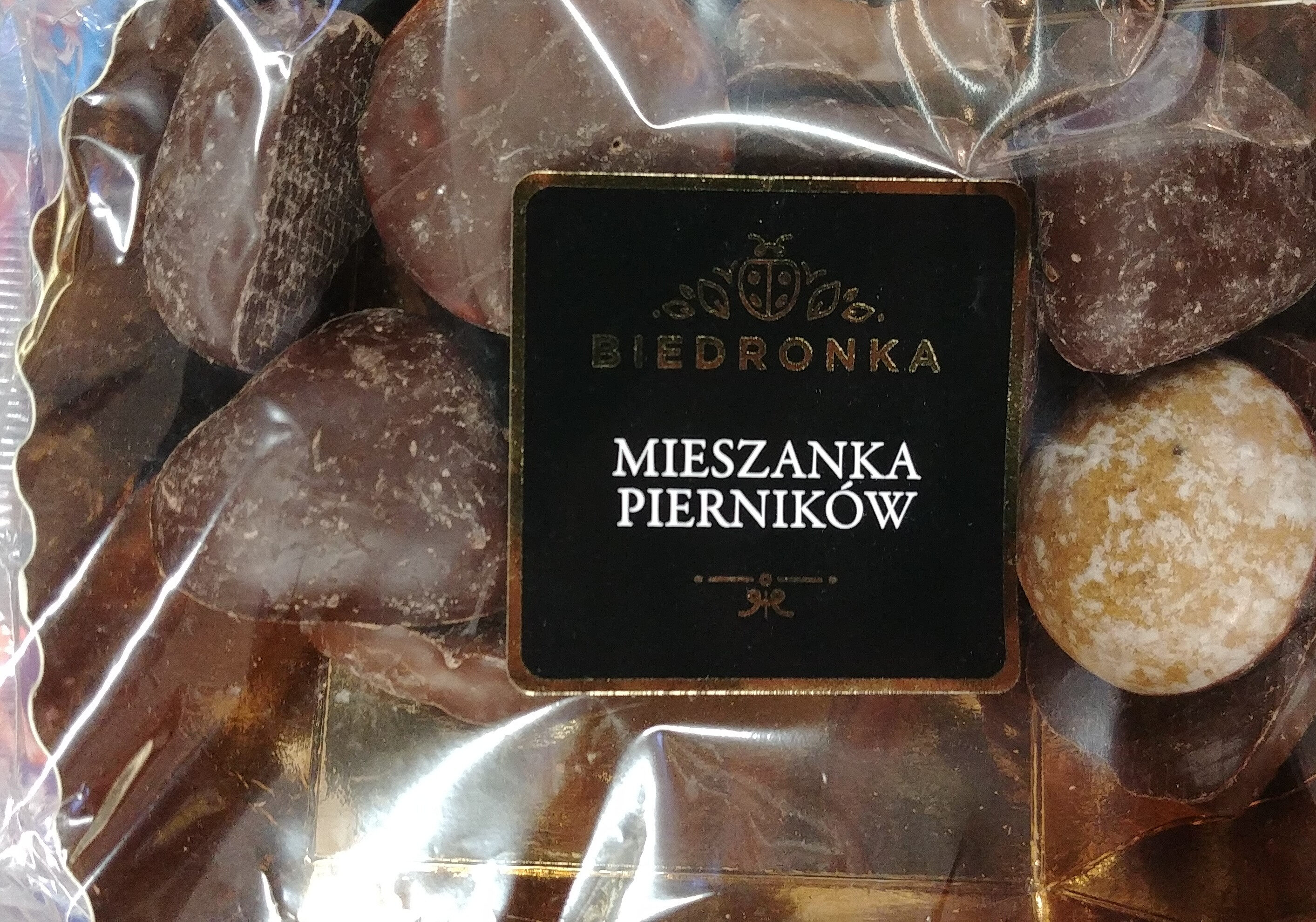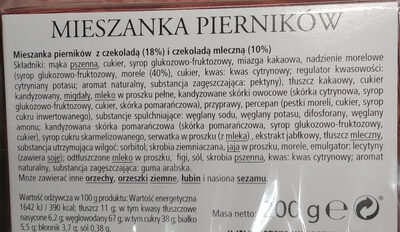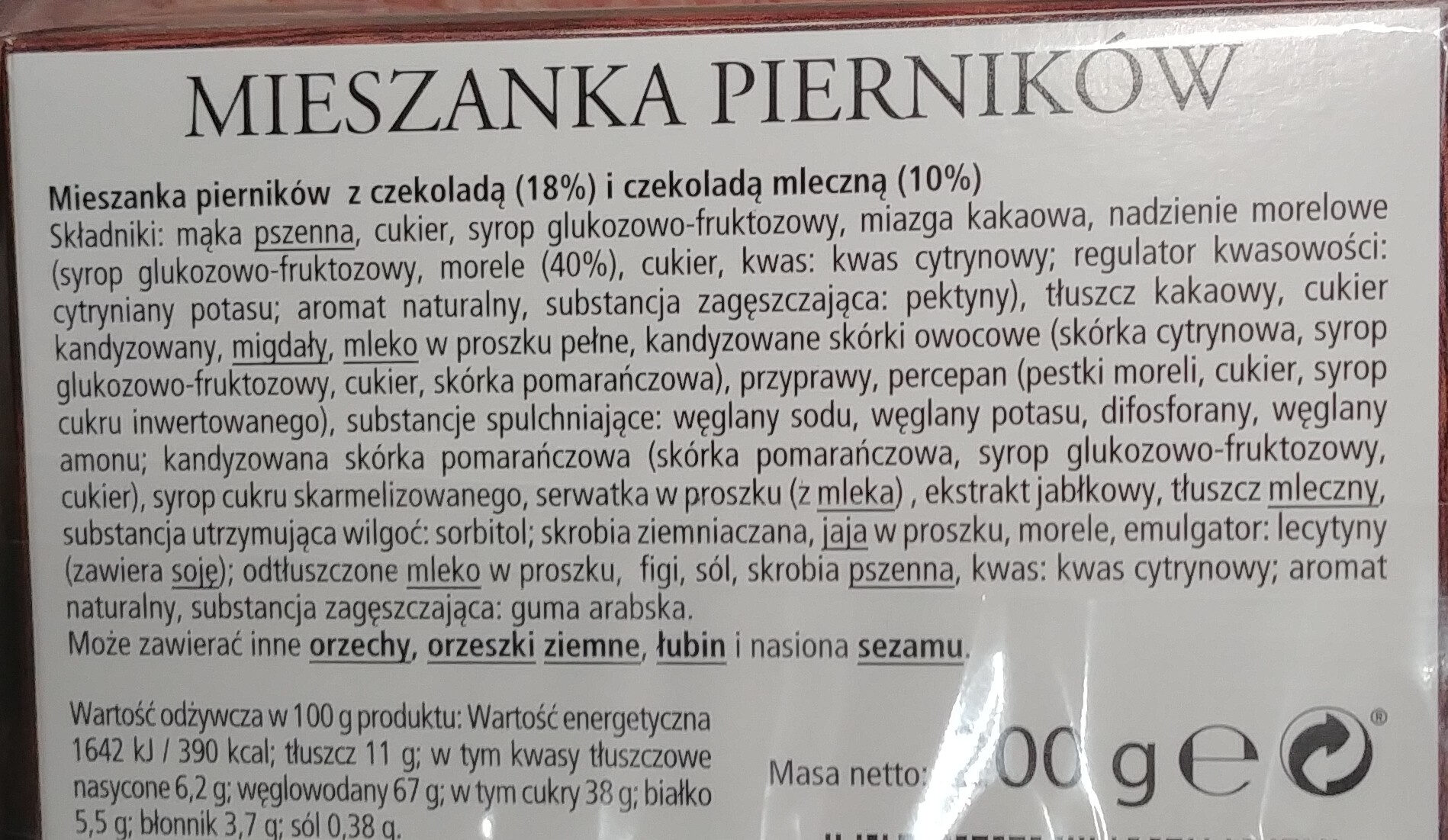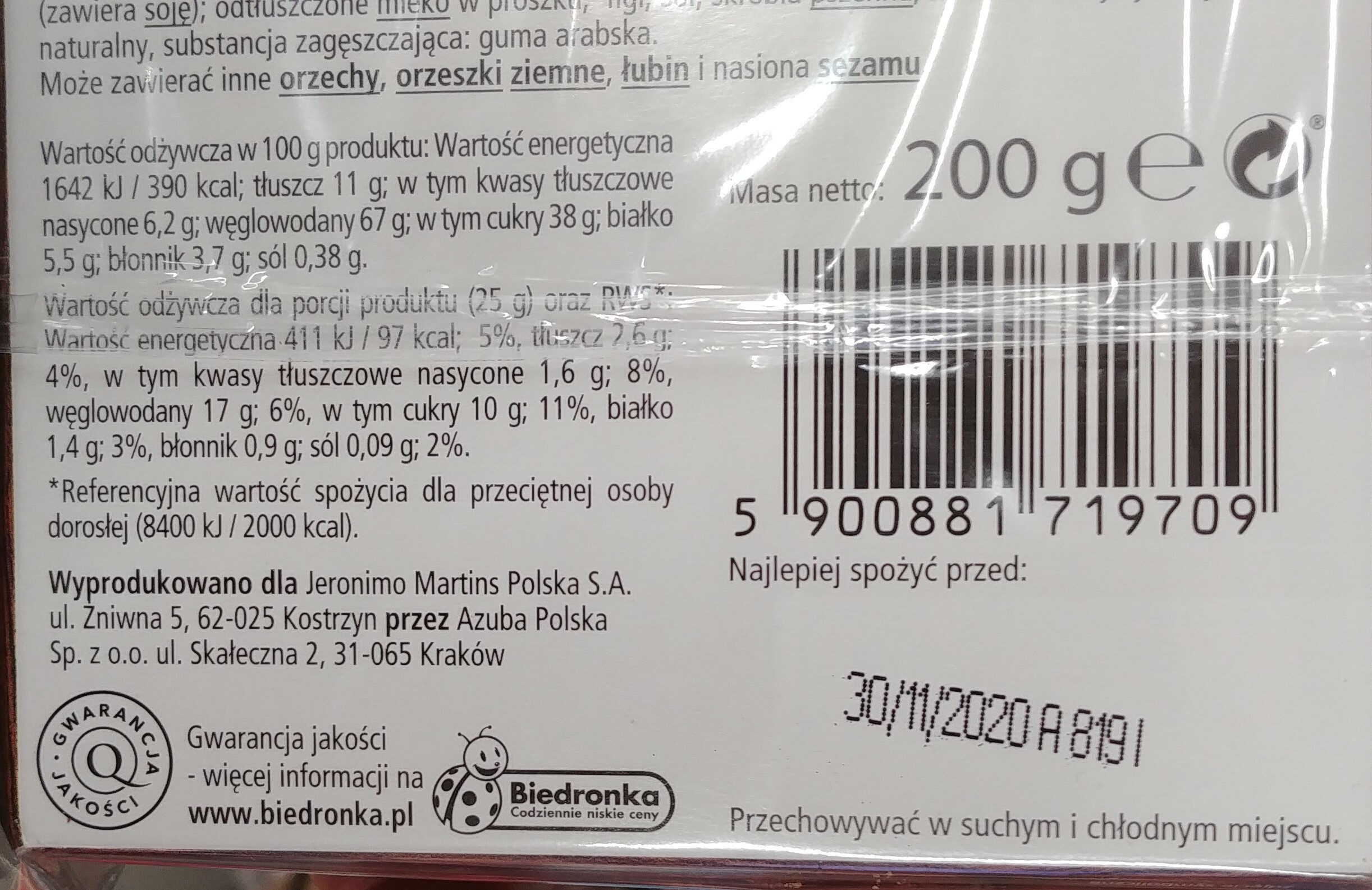Help us make food transparency the norm!
As a non-profit organization, we depend on your donations to continue informing consumers around the world about what they eat.
The food revolution starts with you!
Mieszanka Pierników -
Mieszanka Pierników -
This product page is not complete. You can help to complete it by editing it and adding more data from the photos we have, or by taking more photos using the app for Android or iPhone/iPad. Thank you!
×
Barcode: 5900881719709 (EAN / EAN-13)
Categories: Snacks, Sweet snacks
Labels, certifications, awards: Natural flavors
Countries where sold: Poland
Matching with your preferences
Health
Ingredients
-
60 ingredients
: mąka pszenna, cukier, syrop glukozowo-fruktozowy, miazga kakaowa, nadzienie morelowe (syrop glukozowo-fruktozowy, morele (40%), cukier, kwas: kwas cytrynowy; regulator kwasowości: cytryniany potasu; aromat naturalny, substancja zagęszczająca: pektyny), tłuszcz kakaowy, cukier kandyzowany, migdały, mleko w proszku pełne, kandyzowane skórki owocowe (skórka cytrynowa, syrop glukozowo-fruktozowy, cukier, skórka pomarańczowa), przyprawy, percepan (pestki moreli, cukier, syrop cukru inwertowanego), substancje spulchniające: węglany sodu, węglany potasu, difosforany, węglany amonu; kandyzowana skórka pomarańczowa (skórka pomarańczowa, syrop glukozowo-fruktozowy, cukier), syrop cukru skarmelizowanego, serwatka w proszku (z mleka) , ekstrakt jabłkowy, tłuszcz mleczny, substancja utrzymująca wilgoć: sorbitol; skrobia ziemniaczana, jaja w proszku, morele, emulgator: lecytyny (zawiera soje); odtłuszczone mleko w proszku, figi, sól, skrobia pszenna, kwas: kwas cytrynowy; aromat naturalny, substancja zagęszczająca: guma arabska. Może zawierać: inne orzechy, orzeszki ziemne, łubin, nasiona sezamu.Allergens: Gluten, NutsTraces: Lupin, Nuts, Peanuts, Sesame seeds
Food processing
-
Ultra processed foods
Elements that indicate the product is in the 4 - Ultra processed food and drink products group:
- Additive: E322 - Lecithins
- Additive: E414 - Acacia gum
- Additive: E420 - Sorbitol
- Additive: E440 - Pectins
- Additive: E450 - Diphosphates
- Ingredient: Emulsifier
- Ingredient: Flavouring
- Ingredient: Glucose
- Ingredient: Humectant
- Ingredient: Invert sugar
- Ingredient: Thickener
- Ingredient: Whey
Food products are classified into 4 groups according to their degree of processing:
- Unprocessed or minimally processed foods
- Processed culinary ingredients
- Processed foods
- Ultra processed foods
The determination of the group is based on the category of the product and on the ingredients it contains.
Additives
-
E322 - Lecithins
Lecithins are natural compounds commonly used in the food industry as emulsifiers and stabilizers.
Extracted from sources like soybeans and eggs, lecithins consist of phospholipids that enhance the mixing of oil and water, ensuring smooth textures in various products like chocolates, dressings, and baked goods.
They do not present any known health risks.
-
E330 - Citric acid
Citric acid is a natural organic acid found in citrus fruits such as lemons, oranges, and limes.
It is widely used in the food industry as a flavor enhancer, acidulant, and preservative due to its tart and refreshing taste.
Citric acid is safe for consumption when used in moderation and is considered a generally recognized as safe (GRAS) food additive by regulatory agencies worldwide.
-
E332 - Potassium citrates
Potassium citrate: Potassium citrate -also known as tripotassium citrate- is a potassium salt of citric acid with the molecular formula K3C6H5O7. It is a white, hygroscopic crystalline powder. It is odorless with a saline taste. It contains 38.28% potassium by mass. In the monohydrate form it is highly hygroscopic and deliquescent. As a food additive, potassium citrate is used to regulate acidity and is known as E number E332. Medicinally, it may be used to control kidney stones derived from either uric acid or cystine.Source: Wikipedia
-
E414 - Acacia gum
Gum arabic: Gum arabic, also known as acacia gum, arabic gum, gum acacia, acacia, Senegal gum and Indian gum, and by other names, is a natural gum consisting of the hardened sap of various species of the acacia tree. Originally, gum arabic was collected from Acacia nilotica which was called the "gum arabic tree"; in the present day, gum arabic is collected from acacia species, predominantly Acacia senegal and Vachellia -Acacia- seyal; the term "gum arabic" does not indicate a particular botanical source. In a few cases so‐called "gum arabic" may not even have been collected from Acacia species, but may originate from Combretum, Albizia or some other genus. Producers harvest the gum commercially from wild trees, mostly in Sudan -80%- and throughout the Sahel, from Senegal to Somalia—though it is historically cultivated in Arabia and West Asia. Gum arabic is a complex mixture of glycoproteins and polysaccharides. It is the original source of the sugars arabinose and ribose, both of which were first discovered and isolated from it, and are named after it. Gum arabic is soluble in water. It is edible, and used primarily in the food industry as a stabilizer, with EU E number E414. Gum arabic is a key ingredient in traditional lithography and is used in printing, paint production, glue, cosmetics and various industrial applications, including viscosity control in inks and in textile industries, though less expensive materials compete with it for many of these roles. While gum arabic is now produced throughout the African Sahel, it is still harvested and used in the Middle East.Source: Wikipedia
-
E420 - Sorbitol
Sorbitol: Sorbitol --, less commonly known as glucitol --, is a sugar alcohol with a sweet taste which the human body metabolizes slowly. It can be obtained by reduction of glucose, which changes the aldehyde group to a hydroxyl group. Most sorbitol is made from corn syrup, but it is also found in nature, for example in apples, pears, peaches, and prunes. It is converted to fructose by sorbitol-6-phosphate 2-dehydrogenase. Sorbitol is an isomer of mannitol, another sugar alcohol; the two differ only in the orientation of the hydroxyl group on carbon 2. While similar, the two sugar alcohols have very different sources in nature, melting points, and uses.Source: Wikipedia
-
E440 - Pectins
Pectins (E440) are natural carbohydrates, predominantly found in fruits, that act as gelling agents in the food industry, creating the desirable jelly-like texture in jams, jellies, and marmalades.
Pectins stabilize and thicken various food products, such as desserts, confectioneries, and beverages, ensuring a uniform consistency and quality.
Recognized as safe by various health authorities, pectins have been widely used without notable adverse effects when consumed in typical dietary amounts.
-
E450 - Diphosphates
Diphosphates (E450) are food additives often utilized to modify the texture of products, acting as leavening agents in baking and preventing the coagulation of canned food.
These salts can stabilize whipped cream and are also found in powdered products to maintain their flow properties. They are commonly present in baked goods, processed meats, and soft drinks.
Derived from phosphoric acid, they're part of our daily phosphate intake, which often surpasses recommended levels due to the prevalence of phosphates in processed foods and drinks.
Excessive phosphate consumption is linked to health issues, such as impaired kidney function and weakened bone health. Though diphosphates are generally regarded as safe when consumed within established acceptable daily intakes, it's imperative to monitor overall phosphate consumption to maintain optimal health.
-
E500 - Sodium carbonates
Sodium carbonates (E500) are compounds commonly used in food preparation as leavening agents, helping baked goods rise by releasing carbon dioxide when they interact with acids.
Often found in baking soda, they regulate the pH of food, preventing it from becoming too acidic or too alkaline. In the culinary world, sodium carbonates can also enhance the texture and structure of foods, such as noodles, by modifying the gluten network.
Generally recognized as safe, sodium carbonates are non-toxic when consumed in typical amounts found in food.
-
E503 - Ammonium carbonates
Ammonium carbonate: Ammonium carbonate is a salt with the chemical formula -NH4-2CO3. Since it readily degrades to gaseous ammonia and carbon dioxide upon heating, it is used as a leavening agent and also as smelling salt. It is also known as baker's ammonia and was a predecessor to the more modern leavening agents baking soda and baking powder. It is a component of what was formerly known as sal volatile and salt of hartshorn.Source: Wikipedia
Ingredients analysis
-
May contain palm oil
Ingredients that may contain palm oil: Milkfat
-
Non-vegan
Non-vegan ingredients: Whole milk powder, Whey powder, Milk, Milkfat, Egg powder, Skimmed milk powderSome ingredients could not be recognized.
We need your help!
You can help us recognize more ingredients and better analyze the list of ingredients for this product and others:
- Edit this product page to correct spelling mistakes in the ingredients list, and/or to remove ingredients in other languages and sentences that are not related to the ingredients.
- Add new entries, synonyms or translations to our multilingual lists of ingredients, ingredient processing methods, and labels.
If you would like to help, join the #ingredients channel on our Slack discussion space and/or learn about ingredients analysis on our wiki. Thank you!
-
Vegetarian status unknown
Unrecognized ingredients: pl:kandyzowane-skórki-owocowe, Persipan, pl:zawiera-sojeSome ingredients could not be recognized.
We need your help!
You can help us recognize more ingredients and better analyze the list of ingredients for this product and others:
- Edit this product page to correct spelling mistakes in the ingredients list, and/or to remove ingredients in other languages and sentences that are not related to the ingredients.
- Add new entries, synonyms or translations to our multilingual lists of ingredients, ingredient processing methods, and labels.
If you would like to help, join the #ingredients channel on our Slack discussion space and/or learn about ingredients analysis on our wiki. Thank you!
-
Details of the analysis of the ingredients
We need your help!
Some ingredients could not be recognized.
We need your help!
You can help us recognize more ingredients and better analyze the list of ingredients for this product and others:
- Edit this product page to correct spelling mistakes in the ingredients list, and/or to remove ingredients in other languages and sentences that are not related to the ingredients.
- Add new entries, synonyms or translations to our multilingual lists of ingredients, ingredient processing methods, and labels.
If you would like to help, join the #ingredients channel on our Slack discussion space and/or learn about ingredients analysis on our wiki. Thank you!
: mąka pszenna, cukier, syrop glukozowo-fruktozowy, miazga kakaowa, nadzienie morelowe (syrop glukozowo-fruktozowy, morele, cukier, kwas (kwas cytrynowy), regulator kwasowości (cytryniany potasu), aromat naturalny, substancja zagęszczająca (pektyny)), tłuszcz kakaowy, cukier, migdały, mleko w proszku pełne, kandyzowane skórki owocowe (skórka cytrynowa, syrop glukozowo-fruktozowy, cukier, skórka pomarańczowa), przyprawy, percepan (moreli, cukier, syrop cukru inwertowanego), substancje spulchniające (węglany sodu), węglany potasu, difosforany, węglany amonu, skórka pomarańczowa (skórka pomarańczowa, syrop glukozowo-fruktozowy, cukier), syrop cukru skarmelizowanego, serwatka w proszku (z mleka), jabłkowy, tłuszcz mleczny, substancja utrzymująca wilgoć (sorbitol), skrobia ziemniaczana, jaja w proszku, morele, emulgator (lecytyny (zawiera soje)), odtłuszczone mleko w proszku, figi, sól, skrobia pszenna, kwas (kwas cytrynowy), aromat naturalny, substancja zagęszczająca (guma arabska)- mąka pszenna -> en:wheat-flour - vegan: yes - vegetarian: yes - ciqual_proxy_food_code: 9410 - percent_min: 3.03030303030303 - percent_max: 100
- cukier -> en:sugar - vegan: yes - vegetarian: yes - ciqual_proxy_food_code: 31016 - percent_min: 0 - percent_max: 50
- syrop glukozowo-fruktozowy -> en:glucose-fructose-syrup - vegan: yes - vegetarian: yes - ciqual_food_code: 31077 - percent_min: 0 - percent_max: 33.3333333333333
- miazga kakaowa -> en:cocoa-paste - vegan: yes - vegetarian: yes - ciqual_proxy_food_code: 16030 - percent_min: 0 - percent_max: 25
- nadzienie morelowe -> en:apricot-filling - vegan: maybe - vegetarian: maybe - percent_min: 0 - percent_max: 20
- syrop glukozowo-fruktozowy -> en:glucose-fructose-syrup - vegan: yes - vegetarian: yes - ciqual_food_code: 31077 - percent_min: 0 - percent_max: 20
- morele -> en:apricot - vegan: yes - vegetarian: yes - ciqual_food_code: 13000 - percent_min: 0 - percent_max: 8
- cukier -> en:sugar - vegan: yes - vegetarian: yes - ciqual_proxy_food_code: 31016 - percent_min: 0 - percent_max: 6.66666666666667
- kwas -> en:acid - percent_min: 0 - percent_max: 5
- kwas cytrynowy -> en:e330 - vegan: yes - vegetarian: yes - percent_min: 0 - percent_max: 5
- regulator kwasowości -> en:acidity-regulator - percent_min: 0 - percent_max: 4
- cytryniany potasu -> en:e332 - vegan: yes - vegetarian: yes - percent_min: 0 - percent_max: 4
- aromat naturalny -> en:natural-flavouring - vegan: maybe - vegetarian: maybe - percent_min: 0 - percent_max: 3.33333333333333
- substancja zagęszczająca -> en:thickener - percent_min: 0 - percent_max: 2.85714285714286
- pektyny -> en:e440a - vegan: yes - vegetarian: yes - percent_min: 0 - percent_max: 2.85714285714286
- tłuszcz kakaowy -> en:cocoa-butter - vegan: yes - vegetarian: yes - ciqual_food_code: 16030 - percent_min: 0 - percent_max: 16.6666666666667
- cukier -> en:sugar - vegan: yes - vegetarian: yes - ciqual_proxy_food_code: 31016 - percent_min: 0 - percent_max: 14.2857142857143
- migdały -> en:almond - vegan: yes - vegetarian: yes - ciqual_food_code: 15041 - percent_min: 0 - percent_max: 12.5
- mleko w proszku pełne -> en:whole-milk-powder - vegan: no - vegetarian: yes - ciqual_food_code: 19021 - percent_min: 0 - percent_max: 11.1111111111111
- kandyzowane skórki owocowe -> pl:kandyzowane-skórki-owocowe - percent_min: 0 - percent_max: 10
- skórka cytrynowa -> en:lemon-peel - vegan: yes - vegetarian: yes - ciqual_proxy_food_code: 13009 - percent_min: 0 - percent_max: 10
- syrop glukozowo-fruktozowy -> en:glucose-fructose-syrup - vegan: yes - vegetarian: yes - ciqual_food_code: 31077 - percent_min: 0 - percent_max: 5
- cukier -> en:sugar - vegan: yes - vegetarian: yes - ciqual_proxy_food_code: 31016 - percent_min: 0 - percent_max: 3.33333333333333
- skórka pomarańczowa -> en:orange-zest - vegan: yes - vegetarian: yes - ciqual_proxy_food_code: 13034 - percent_min: 0 - percent_max: 2.5
- przyprawy -> en:condiment - vegan: maybe - vegetarian: maybe - percent_min: 0 - percent_max: 9.09090909090909
- percepan -> en:persipan - percent_min: 0 - percent_max: 8.33333333333333
- moreli -> en:apricot - vegan: yes - vegetarian: yes - ciqual_food_code: 13000 - percent_min: 0 - percent_max: 8.33333333333333
- cukier -> en:sugar - vegan: yes - vegetarian: yes - ciqual_proxy_food_code: 31016 - percent_min: 0 - percent_max: 4.16666666666667
- syrop cukru inwertowanego -> en:invert-sugar-syrup - vegan: yes - vegetarian: yes - percent_min: 0 - percent_max: 2.77777777777778
- substancje spulchniające -> en:raising-agent - percent_min: 0 - percent_max: 7.69230769230769
- węglany sodu -> en:e500 - vegan: yes - vegetarian: yes - percent_min: 0 - percent_max: 7.69230769230769
- węglany potasu -> en:e501 - vegan: yes - vegetarian: yes - percent_min: 0 - percent_max: 7.14285714285714
- difosforany -> en:e450 - vegan: yes - vegetarian: yes - percent_min: 0 - percent_max: 6.66666666666667
- węglany amonu -> en:e503 - vegan: yes - vegetarian: yes - percent_min: 0 - percent_max: 6.25
- skórka pomarańczowa -> en:orange-zest - vegan: yes - vegetarian: yes - ciqual_proxy_food_code: 13034 - percent_min: 0 - percent_max: 5.88235294117647
- skórka pomarańczowa -> en:orange-zest - vegan: yes - vegetarian: yes - ciqual_proxy_food_code: 13034 - percent_min: 0 - percent_max: 5.88235294117647
- syrop glukozowo-fruktozowy -> en:glucose-fructose-syrup - vegan: yes - vegetarian: yes - ciqual_food_code: 31077 - percent_min: 0 - percent_max: 2.94117647058824
- cukier -> en:sugar - vegan: yes - vegetarian: yes - ciqual_proxy_food_code: 31016 - percent_min: 0 - percent_max: 1.96078431372549
- syrop cukru skarmelizowanego -> en:caramelised-sugar-syrup - vegan: yes - vegetarian: yes - ciqual_proxy_food_code: 31016 - percent_min: 0 - percent_max: 5.55555555555556
- serwatka w proszku -> en:whey-powder - vegan: no - vegetarian: maybe - percent_min: 0 - percent_max: 5.26315789473684
- z mleka -> en:milk - vegan: no - vegetarian: yes - ciqual_proxy_food_code: 19051 - percent_min: 0 - percent_max: 5.26315789473684
- jabłkowy -> en:apple - vegan: yes - vegetarian: yes - ciqual_food_code: 13050 - percent_min: 0 - percent_max: 5
- tłuszcz mleczny -> en:milkfat - vegan: no - vegetarian: yes - from_palm_oil: maybe - percent_min: 0 - percent_max: 4.76190476190476
- substancja utrzymująca wilgoć -> en:humectant - percent_min: 0 - percent_max: 4.54545454545455
- sorbitol -> en:e420 - vegan: yes - vegetarian: yes - percent_min: 0 - percent_max: 4.54545454545455
- skrobia ziemniaczana -> en:potato-starch - vegan: yes - vegetarian: yes - ciqual_proxy_food_code: 9510 - percent_min: 0 - percent_max: 4.34782608695652
- jaja w proszku -> en:egg-powder - vegan: no - vegetarian: yes - ciqual_food_code: 22000 - percent_min: 0 - percent_max: 4.16666666666667
- morele -> en:apricot - vegan: yes - vegetarian: yes - ciqual_food_code: 13000 - percent_min: 0 - percent_max: 4
- emulgator -> en:emulsifier - percent_min: 0 - percent_max: 3.84615384615385
- lecytyny -> en:e322 - vegan: maybe - vegetarian: maybe - percent_min: 0 - percent_max: 3.84615384615385
- zawiera soje -> pl:zawiera-soje - percent_min: 0 - percent_max: 3.84615384615385
- lecytyny -> en:e322 - vegan: maybe - vegetarian: maybe - percent_min: 0 - percent_max: 3.84615384615385
- odtłuszczone mleko w proszku -> en:skimmed-milk-powder - vegan: no - vegetarian: yes - ciqual_food_code: 19054 - percent_min: 0 - percent_max: 3.7037037037037
- figi -> en:fig - vegan: yes - vegetarian: yes - ciqual_food_code: 13012 - percent_min: 0 - percent_max: 3.57142857142857
- sól -> en:salt - vegan: yes - vegetarian: yes - ciqual_food_code: 11058 - percent_min: 0 - percent_max: 3.44827586206897
- skrobia pszenna -> en:wheat-starch - vegan: yes - vegetarian: yes - ciqual_proxy_food_code: 9510 - percent_min: 0 - percent_max: 3.33333333333333
- kwas -> en:acid - percent_min: 0 - percent_max: 3.2258064516129
- kwas cytrynowy -> en:e330 - vegan: yes - vegetarian: yes - percent_min: 0 - percent_max: 3.2258064516129
- aromat naturalny -> en:natural-flavouring - vegan: maybe - vegetarian: maybe - percent_min: 0 - percent_max: 3.125
- substancja zagęszczająca -> en:thickener - percent_min: 0 - percent_max: 3.125
- guma arabska -> en:e414 - vegan: yes - vegetarian: yes - percent_min: 0 - percent_max: 3.125
Nutrition
-
Missing data to compute the Nutri-Score
Missing nutrition facts
⚠ ️The nutrition facts of the product must be specified in order to compute the Nutri-Score.Could you add the information needed to compute the Nutri-Score? Add nutrition facts
-
Nutrition facts
Nutrition facts As sold
for 100 g / 100 mlCompared to: Sweet snacks Fat ? Saturated fat ? Carbohydrates ? Sugars ? Fiber ? Proteins ? Salt ? Fruits‚ vegetables‚ nuts and rapeseed‚ walnut and olive oils (estimate from ingredients list analysis) 1.208 %
Environment
-
Eco-Score not computed - Unknown environmental impact
We could not compute the Eco-Score of this product as it is missing some data, could you help complete it?Could you add a precise product category so that we can compute the Eco-Score? Add a category
Packaging
-
Missing packaging information for this product
⚠ ️ The information about the packaging of this product is not filled in.Take a photo of the recycling information Take a photo of the recycling information
Transportation
-
Origins of ingredients
Missing origins of ingredients information
⚠ ️ The origins of the ingredients of this product are not indicated.
If they are indicated on the packaging, you can modify the product sheet and add them.
If you are the manufacturer of this product, you can send us the information with our free platform for producers.Add the origins of ingredients for this product Add the origins of ingredients for this product
Report a problem
-
Incomplete or incorrect information?
Category, labels, ingredients, allergens, nutritional information, photos etc.
If the information does not match the information on the packaging, please complete or correct it. Open Food Facts is a collaborative database, and every contribution is useful for all.
Data sources
Product added on by pyrka
Last edit of product page on by sierigh.
Product page also edited by openfoodfacts-contributors.








